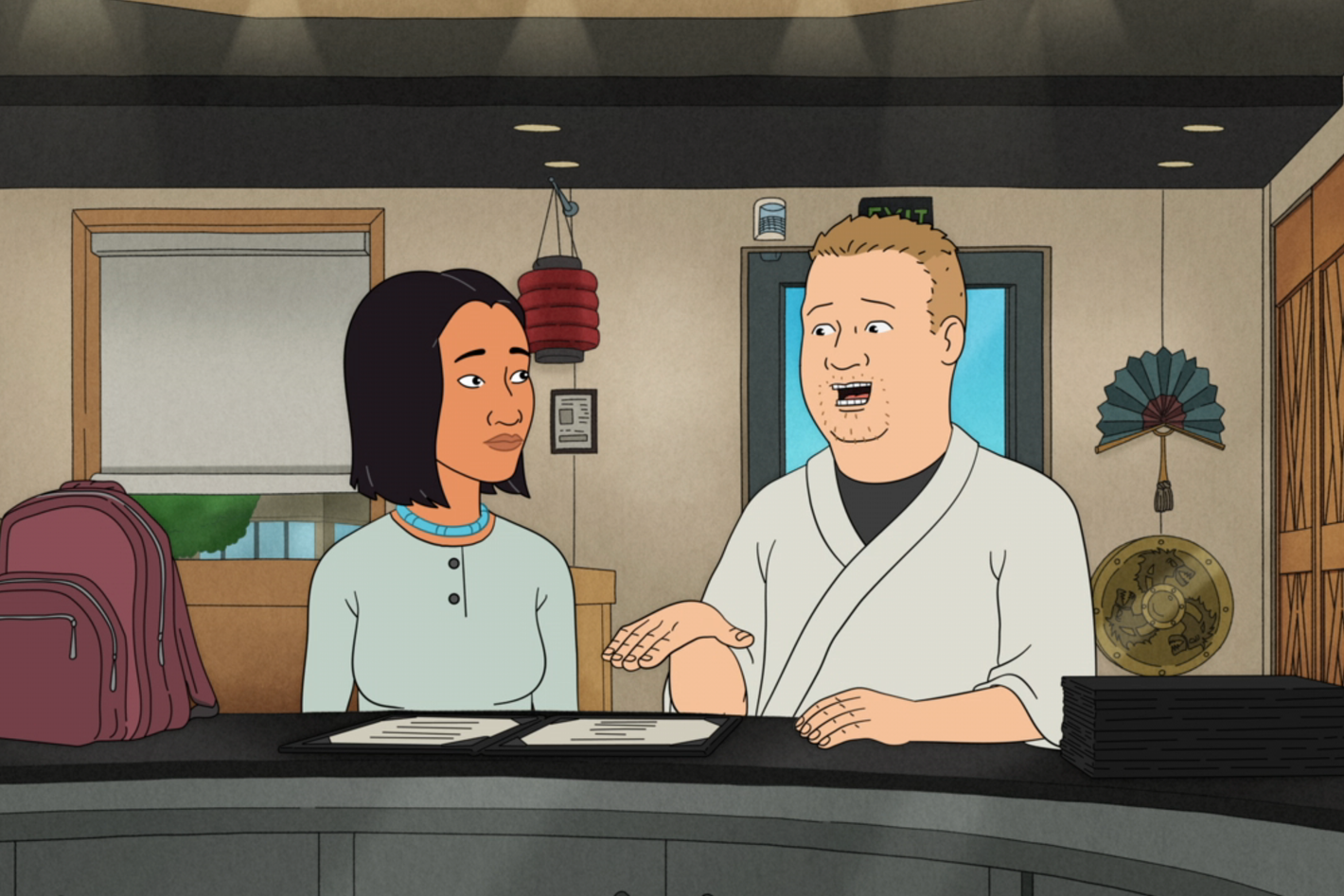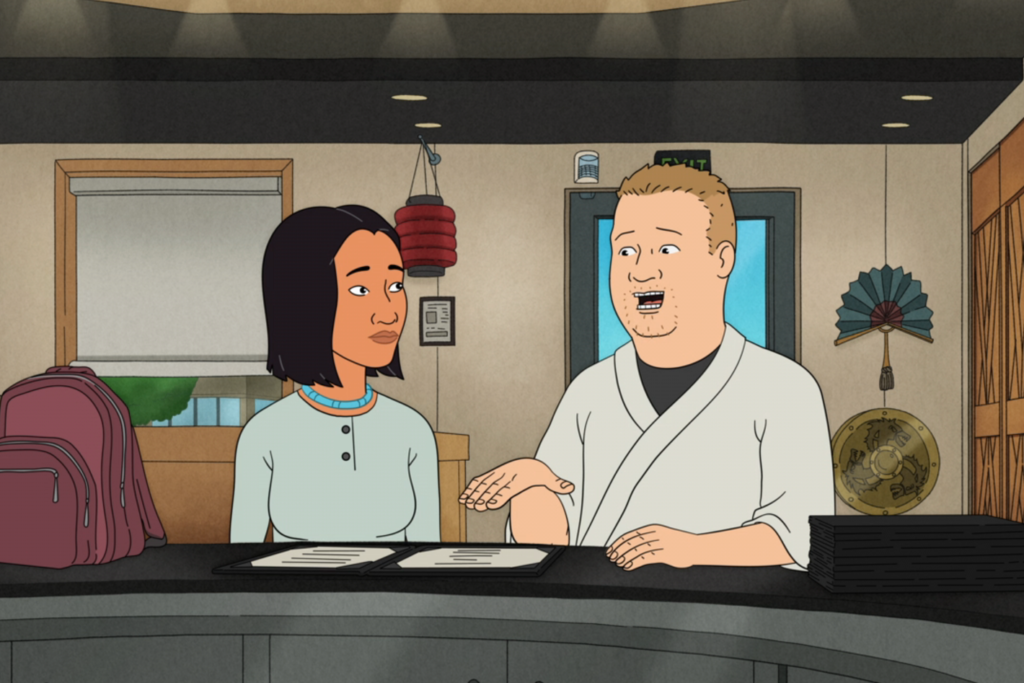
Have you been distracted while watching this season wondering When is Kahn going to show up? I admit I haven’t really. Yes, his absence has been semi-conspicuous given that it was confirmed Kahn would be returning to this revival with a new voice actor, Ronny Chieng, and because Minh has already appeared several times without him (which this episode indirectly explains). But I’m generally of the mind that Kahn is a character best administered in small and infrequent doses, so I wasn’t exactly fretting over his absence to this point. As it turns out, though, he’s the secret ingredient that’s been missing from this revival, his delayed introduction in “Kahn-scious Uncoupling” making the episode a solid contender for the best of the season so far.
Admittedly, that’s attributable less to Kahn himself — who remains as prideful and abrasive as ever, only now with a noticeably different voice — than the narrative function his character serves. His and Minh’s 30th sham-iversary party at the Nine Rivers Country Club is a perfect construction to get nearly all of this revival’s significant character groupings in a room together. Since Hank is the best friend Kahn has, even though he’d never admit it, obviously the Hills are there. Since Kahn is cheap, he’s tapped various members of the alley gang to work the party, which gets Dale and Boomhauer in the mix as videographer and bartender, respectively, with bandleader Brian Robertson as a bonus; even Bill has a reason to flit around the edges of the party as he attempts to gatecrash, since Kahn still hasn’t forgiven his now-deceased mother’s former boyfriend. And since Kahn’s main goal in life continues to be impressing the Wassanasongs, he hires Robata Chane to cater, which not only gives Bobby a reason to be at a party that he would otherwise never be invited to, it gives him a reason to be there as Connie is confronting the reality of her open relationship in front of two people who want nothing more than to be able to call Chane their son-in-law.
Given the nature of this purported celebration, the question of what makes a successful relationship drives this episode. The opening scene foregrounds this by putting Hank and Peggy’s marriage in literal competition with Kahn and Minh’s, first indirectly through their bowling scores and then directly through the number of years they’ve been married: Hank and Peggy just celebrated their 29th anniversary (they ordered in), putting their marriage in second place behind Kahn and Minh’s, or so Team Souphan gloats. Bowling scores are also the starting point for Hank and Peggy’s arc this episode, with Hank refusing to back up his wife’s “embellishment” of her score from when they played on the Aramco league, a tiny lie that will soon intersect with Kahn and Minh’s big one. Hank doesn’t see 100 points as just an embellishment — “On a scale from 1 to 100 you lied the most you could possibly lie” — while Peggy’s frustration over his refusal to support her version of events sets up the conflict between them once Hank agrees to play “accomplice” for someone to whom he hasn’t been married for 29 years, and who he doesn’t even really like.
That isn’t to say Hank and Kahn don’t have history, which “Kahn-scious Uncoupling” draws upon when Hank discovers his neighbor has been living in the garage since he and Minh divorced two years ago. Hank’s seen his sort-of friend at some of his lowest lows and has almost always resisted the urge to throw it back in Kahn’s face the way Peggy would, which surely weighs on them both as Kahn begs Hank not to say anything to anyone, especially his wife, about a situation even the geckos who have sex on his bed every night can see is “pathetic.” Hank agrees for the sake of Kahn’s family’s reputation, and Kahn promises to return the favor when Hank gets divorced.
We all know that won’t happen, but the comment hangs over Hank and Peggy’s tussle over keeping Kahn and Minh’s secret, and sets up the sweet reaffirmation of their marriage by episode’s end. But before we get there, let’s see how the other Souphanousinphones are dealing with this. We unfortunately don’t get much of Minh’s perspective on the whole thing, since she spends most of this episode as Kahn’s accomplice in both pretending they’re still married and sucking up to the Wassanasongs, who are glad and obligated to be at the party. But when the truth comes out, she’s the one who gives up the ghost first, which feels telling. She also gets a revealing scene with Connie at the bar that adds a nice layer of emotional complexity to Minh’s side of the divorce, but is more about how Connie is dealing with her parents’ pathological obsession with keeping up appearances. And even before she blows up at her mom that she doesn’t want to make the same mistakes that Minh did for the sake of a “happy marriage,” Connie’s not dealing with it very well, though, as an overachiever, she does her best to put up a good front.
If Adult Bobby is this revival season’s most exciting development, Adult Connie is a close second, and much of what makes both characters great is in their own long-term relationship. Even though we’ve mostly seen it in the context of Bobby’s story, Connie’s navigation of young adulthood has been both interesting to watch and a natural-feeling evolution of the character we knew as a child. I feel a little foolish being surprised at episode four’s reveal that Connie is dating Chane, having overlooked that this is exactly what her parents have always wanted for/expected of her, but with an open-relationship twist that reflects her history of pushing against those expectations and creates tension in her friendship with Bobby, whom her parents never approved of. This pairing isn’t random; it’s rich in character detail, and it all pays off beautifully in “Kahn-scious Uncoupling.” Connie needs someone to talk to about both her parents and Chane, and clearly wants that person to be Bobby, but his current crush on her makes that a position he’s uncomfortable with. So he keeps steering the discussion back to the menu he’s created for the party, because as he tells her, good food can solve any problem.
Bobby’s food doesn’t exactly solve Connie’s problem, but it does help give her some clarity about the man behind the “Laotian Love” menu that everyone is raving about, as well as the man taking unearned credit for it; between this and him passing off the “cool S” as his own, Joseph is right that Chane remains a tool. Joseph’s also correct that Bobby should be proud that everyone at the party loves his food, but it’s obvious there’s only one person Bobby is really trying to impress, and she’s at the bar ordering a Minh julep. We know Bobby is committed to authenticity in ethnic cuisine, but would he really have gone through the effort of tracking down galangal root and making coconut pearls to please the people who describe him to the Wassanasongs as “barely housebroken” and “a chubby stepping stone”?
Kahn and Minh’s dismissal of Connie and Bobby’s relationship as “not real” nearly causes Peggy to do what she’s been dying to do and throw what she knows back in their faces — and honestly, I would have liked to see it! Especially because the way the truth actually comes out a few scenes later, thanks to Dale’s conveniently dropped camera and unlabeled A/V equipment, is a little forced in its mechanics. But Peggy lashing out in that moment at two people who definitely deserve it wouldn’t have the same emotional impact as what we get, which foregrounds Connie’s much more complicated feelings. So it’s probably for the best that after Hank steers Peggy away for some weird, angry dancing, she reels it in for Bobby’s sake, and because she doesn’t want to lose their secret-keeping competition to the world’s worst liar with the cleanest glasses. (Hank points out, “It’s fine if this ends in a tie. Soccer taught me that that’s okay.”)
Bobby’s also struggling to bite his tongue over how Chane is treating Connie, whom he wants to help but doesn’t see how he can without confronting the guy whose dad is his boss. But when he learns about the divorce from Hank and Peggy mid-cha-cha slide (Everybody, clap your hands!) he realizes that what Connie needs isn’t food or confrontation, she just needs someone to be there for her while she processes what’s happening with her parents and her shitty boyfriend. And yeah, his attempt to do so at the bar blows up her parents’ ruse as well as Connie’s commitment to ethical nonmonogamy with Chane — who didn’t consent to Connie forcing him to feel her feelings — but safe to say both of those things needed to be blown up. It may not feel that way to Connie just yet, but after a great little conversation in the bathroom with Peggy, who assures her she doesn’t have to end up like her parents, and especially a hug from Bobby, who comes prepared with mango sticky rice just in case, she seems to be doing a little better.
Unfortunately, the same can’t be said for Kahn, who doesn’t share his daughter’s affection toward the members of the Hill family right now. As he’s packing up the garage, he briefly considers Hank and the guys’ offer of an Alamo and the support of a community to replace the one that rejected him, but then seems to remember that Hank is responsible, however indirectly, for that rejection. (Dale certainly didn’t help matters.) For a character as proud as Kahn, this may be unforgivable, despite the consolatory Alamo that Hank rolls under the closing garage door. It’s a gesture that leaves the door open to neighborly reconciliation, though if Kahn is indeed leaving Rainey Street for good, I’m not sure how much opportunity there will be for the show to incorporate him going forward. That may not be such a bad thing, though, since this episode proves how a little Kahn can still go a long way. At least the guy can take pride in the fact that his shame facilitated such a fantastic episode.
Musings
• That opening scene is a marvel of storytelling efficiency; I probably could have written several more paragraphs on it in addition to the one above. But instead, I’ll just note here that it not only establishes the reasoning for Team Gribhauer to be at the party, it sets up Dale’s contribution to the episode’s climax with the hidden camera he’s been using to film the night without their knowledge. And then on top of all that, it manages to foreshadow Bill’s role at the party, which is the same as his role at bowling night: uninvited interloper who ends up just being there for the food.
• The only returning characters who get left out of this episode are Nancy and John Redcorn, which was probably a good call. I’m sure the writers could have come up with a believable reason for them to be there — Nancy and Minh are close, right? — but the addition of another fractured marriage/love-triangle dynamic to the party would have been too many moving parts, especially with Joseph there playing cater-waiter.
• When they hear noises coming from outside, Peggy immediately pulls out a gun safe, unlocks it, and hands Hank … a nail gun. So much meaning communicated in one small visual gag. I wonder if it’s one of the five nail guns Hank told Boomhauer he had in episode four.
• Renaissance man that he is, Boomhauer appears to be proficient in both flair bartending and molecular mixology (or however you characterize whatever he did to that beer to turn it into a crunchy blue ball — “smoke, man”).
• Hank Hill loving the cha-cha slide seems incongruous until you realize, of course, this man loves “a dance with clear rules and instructions.”
• Bill asking Kahn if he can ask out Minh as the garage closes is a real twist of the knife.
• One more conspicuous character absence this season: Buck Strickland. We don’t yet know the circumstances of Hank’s departure from Strickland Propane or even if the old cuss is still alive, but I hope we find out soon.
Kahn makes his less-than-triumphant return just in time to send Connie spiraling over her relationship with her parents and boyfriend.































































